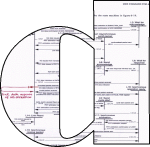
PROBABILISTIC CONCURRENCY MODELS
 | ||
This is a doctoral privatissimum, a new type of intensive course for students in the Saarbrücken Graduate School of Computer Science. The number of students is limited to 6. Earlier exposure to basic concepts of concurrency theory and of probability theory is helpful, but no strict requirement.
Objectives
A probabilistic concurrent model is a mathematical model that represents in a formal way a real system that involves at the same time concurrent components and probabilistic choices such as a distributed authentication system or home banking.
Several models have been proposed to study properties of this kind of systems, where different aspects are considered such as how time passes, how several components interact, and how properties of the overall system can be derived from properties of building components.
These models consider discrete and continuous time, labeled and unlabeled transitions, probabilistic and nondeterministic choices, and combinations of all these aspects.
This course aims to present the models, the problems they address, the known results, and the challenges/open questions not yet solved.
Overview of the course
 | a brief presentation of concurrency theory |
 | an overview of the models: DTMC, MDP, PA for discrete time, CTMC, IMC, MA for continuous time |
 | a detailed analysis of the above models, their applicability and results |
 | presentation of challenges/open questions about the models |
Time and location
The course starts on October 18, 2011 and runs until the beginning of December.
There are two meetings per week. They are expected to take place each Tuesday at 12:00-14:00 and Friday at 14:00-16:00. We might shift these dates based on preferences of the participants. Room will be announced.
Registration
If you would like to participate in this course, please send a short email, including a brief statement of your relevant background to one of the instructors. We might need to initialize the course with a participant casting.
Instructors
 | Prof. Dr.-Ing. Holger Hermanns |
 | Dr. Andrea Turrini |